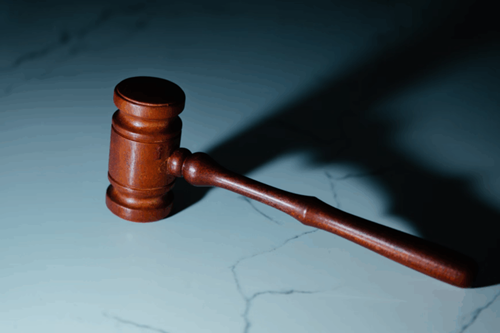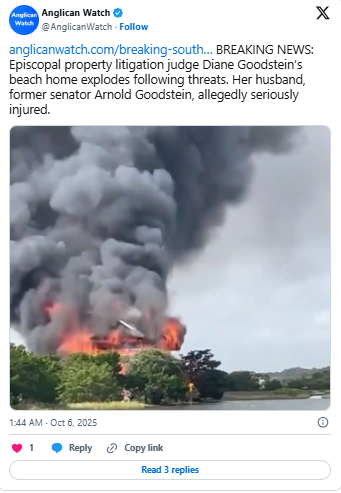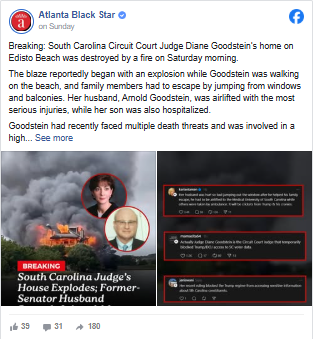
Just over a month after she delivered a pivotal court ruling in a politically charged case involving voter data privacy, South Carolina Circuit Court Judge Diane Goodstein’s life was upended by a harrowing and still-unexplained event: a fire that engulfed and destroyed her family’s marshfront home in Edisto Beach. The morning of Saturday, October 4, 2025, began like many others for Judge Goodstein. She was walking her dogs along the quiet shoreline near her home, situated in the gated, tree-lined Jeremy Cay Community on Edisto Island, when a massive fire broke out in her three-story residence at 18 Planters Retreat.
Within minutes, what began as a peaceful day turned into a scene of panic, fear, and destruction. A Peaceful Morning Turns Into a Nightmare. The fire reportedly began shortly before 11:30 a.m., and it escalated rapidly. Thick black smoke could be seen billowing above the island, and neighbors quickly realized something was terribly wrong. Witnesses described hearing a loud explosion moments before the flames erupted.
Judge Goodstein’s husband, Arnold Goodstein, a former state senator and decorated Vietnam veteran, was inside the house along with at least two other family members—one of whom was later identified as their son, Arnold Samuel Goodstein II. Trapped by the fire and smoke, Arnold was forced to make a split-second decision: he jumped from the back of the burning home into the dangerous marshland below.
According to eyewitness Tom Peterson, a neighbor who rushed to the scene, Judge Goodstein was returning from her walk when she saw the smoke and realized her husband was in danger. Due to the remote location and difficult terrain, emergency responders had trouble reaching the marsh. Local residents joined forces with paramedics in a dramatic and desperate rescue mission. Using a rope and canoe, they pulled Arnold and two others from the swamp.

Multiple Injuries Reported
According to the St. Paul Fire District, three individuals suffered serious injuries and were taken to area hospitals. Arnold Goodstein sustained multiple broken bones in his legs, feet, and hips as a result of his fall. His son also required hospitalization due to injuries suffered during the escape and rescue effort. At least one of the victims was transported to the Medical University of South Carolina (MUSC) in Charleston for emergency treatment.
Witnesses on the scene, including Angie Moore, described the home as “completely engulfed in flames” by 1:35 p.m., suggesting that the fire spread with alarming speed.
Investigation Underway — Explosion and Arson Not Ruled Out
The South Carolina Law Enforcement Division (SLED) was notified immediately and opened a formal investigation into the incident. The cause of the fire remains officially undetermined. While no conclusions have yet been released publicly, arson has not been ruled out, and several aspects of the case have raised red flags.
According to Chief Justice John Kittredge of the South Carolina Supreme Court, the blaze appears to have been caused by an explosion inside the house. In a statement issued to court officials, he revealed that the fire “resulted from an apparent explosion… that destroyed the home.” He also stated that other family members, including children and possibly grandchildren, were present at the time, and had to jump from windows or balconies to escape the blaze. Some suffered broken bones in the process.

To date, SLED has not released any information about possible ignition sources, accelerants, or whether the explosion was mechanical, electrical, or intentional. The property has been secured for forensic investigation, and agents are examining debris, wiring, fuel lines, and structural elements of the house.
A Legal Backdrop: Judge Goodstein’s Recent Ruling on Voter Data
This tragic event came only a few weeks after Judge Goodstein presided over a high-profile legal case involving the release of South Carolina voter data to the U.S. Department of Justice. On September 2, 2025, she issued a temporary restraining order (TRO) preventing the South Carolina Election Commission from releasing voter registration data that included private information, such as partial Social Security numbers and driver’s license numbers.
The legal challenge was filed by Calhoun County resident Anne Crooks, who argued that the release would violate her right to privacy under the South Carolina Constitution. Judge Goodstein agreed, citing the “likelihood that immediate and irreparable damage will result to Plaintiff if her personal data is released.”

The ruling was viewed by many as controversial and quickly became the subject of political debate. Some praised the judge for defending personal privacy; others criticized the decision as obstructive to federal investigations into election integrity.
Threats and Security Concerns
In the days following the fire, new details emerged suggesting that Judge Goodstein may have been the target of previous death threats. A fellow judge, speaking anonymously, confirmed that she had received “multiple threats over the years,” including some potentially related to her rulings in politically sensitive cases.
Given the timing of the explosion and fire, speculation quickly turned toward the possibility of intentional harm. Though SLED has not confirmed whether the fire was criminal in nature, law enforcement has increased patrols and security around Judge Goodstein and her family.
Chief Justice Kittredge emphasized that SLED Chief Mark Keel is personally overseeing the investigation. “Until a cause is determined,” he said, “extra security measures have been implemented, and local authorities are coordinating closely with state investigators.”
A Family Rooted in Public Service
The Goodsteins are not only well-known in South Carolina’s legal circles, but they are also a family deeply rooted in public service. Judge Diane Goodstein began practicing law in the early 1980s after earning her Juris Doctor from the University of North Carolina School of Law. In 1998, she was elected by the South Carolina General Assembly as the Resident Circuit Judge for the First Judicial Circuit, covering Orangeburg, Calhoun, and Dorchester counties.
She has served on several judicial boards and committees, including the Commission on Judicial Conduct and the Circuit Court Judges Advisory Committee. She and her husband founded the law firm Goodstein & Goodstein, P.A., which has served Charleston and surrounding areas for decades.
Arnold Goodstein has a distinguished career as both a lawyer and a public servant. He previously served as a member of the South Carolina House of Representatives and as a state senator, representing Charleston County as a Democrat. He also held the role of Commissioner of the Department of Transportation, and earlier in life, he served as a combat advisor during the Vietnam War, where he was awarded the Bronze Star.
The couple are active members of Temple Kahal Kadosh Beth Elohim in Charleston, one of the oldest synagogues in the United States. Their children, Arnold Samuel II and Eve Schafer Goodstein, have also participated in civic and legal causes.
A Community in Shock — And a Case Still Unsolved
The fire that destroyed the Goodstein residence has sent shockwaves through the small, tight-knit community of Edisto Island, and through the broader legal and political circles of South Carolina. The investigation continues, but the full truth about what happened — and why — remains elusive.
As of mid-October, SLED investigators had yet to issue a conclusive report. Public interest remains high, especially in light of the possible connection between Judge Goodstein’s judicial work and the timing of the fire. While the community rallies around the Goodsteins, questions continue to mount.
Was this fire an accident, or something far more sinister?
Until authorities release the results of their investigation, the tragic destruction of the Goodstein home will remain both a personal disaster for one of South Carolina’s most respected legal families — and a potential turning point in the ongoing debate about judicial safety, political threats, and the cost of serving the public in an increasingly divided landscape.
Just over a month after she delivered a pivotal court ruling in a politically charged case involving voter data privacy, South Carolina Circuit Court Judge Diane Goodstein’s life was upended by a harrowing and still-unexplained event: a fire that engulfed and destroyed her family’s marshfront home in Edisto Beach. The morning of Saturday, October 4, 2025, began like many others for Judge Goodstein. She was walking her dogs along the quiet shoreline near her home, situated in the gated, tree-lined Jeremy Cay Community on Edisto Island, when a massive fire broke out in her three-story residence at 18 Planters Retreat.
Within minutes, what began as a peaceful day turned into a scene of panic, fear, and destruction. A Peaceful Morning Turns Into a Nightmare. The fire reportedly began shortly before 11:30 a.m., and it escalated rapidly. Thick black smoke could be seen billowing above the island, and neighbors quickly realized something was terribly wrong. Witnesses described hearing a loud explosion moments before the flames erupted.
Judge Goodstein’s husband, Arnold Goodstein, a former state senator and decorated Vietnam veteran, was inside the house along with at least two other family members—one of whom was later identified as their son, Arnold Samuel Goodstein II. Trapped by the fire and smoke, Arnold was forced to make a split-second decision: he jumped from the back of the burning home into the dangerous marshland below.
According to eyewitness Tom Peterson, a neighbor who rushed to the scene, Judge Goodstein was returning from her walk when she saw the smoke and realized her husband was in danger. Due to the remote location and difficult terrain, emergency responders had trouble reaching the marsh. Local residents joined forces with paramedics in a dramatic and desperate rescue mission. Using a rope and canoe, they pulled Arnold and two others from the swamp.

Multiple Injuries Reported
According to the St. Paul Fire District, three individuals suffered serious injuries and were taken to area hospitals. Arnold Goodstein sustained multiple broken bones in his legs, feet, and hips as a result of his fall. His son also required hospitalization due to injuries suffered during the escape and rescue effort. At least one of the victims was transported to the Medical University of South Carolina (MUSC) in Charleston for emergency treatment.
Witnesses on the scene, including Angie Moore, described the home as “completely engulfed in flames” by 1:35 p.m., suggesting that the fire spread with alarming speed.
Investigation Underway — Explosion and Arson Not Ruled Out
The South Carolina Law Enforcement Division (SLED) was notified immediately and opened a formal investigation into the incident. The cause of the fire remains officially undetermined. While no conclusions have yet been released publicly, arson has not been ruled out, and several aspects of the case have raised red flags.
According to Chief Justice John Kittredge of the South Carolina Supreme Court, the blaze appears to have been caused by an explosion inside the house. In a statement issued to court officials, he revealed that the fire “resulted from an apparent explosion… that destroyed the home.” He also stated that other family members, including children and possibly grandchildren, were present at the time, and had to jump from windows or balconies to escape the blaze. Some suffered broken bones in the process.

To date, SLED has not released any information about possible ignition sources, accelerants, or whether the explosion was mechanical, electrical, or intentional. The property has been secured for forensic investigation, and agents are examining debris, wiring, fuel lines, and structural elements of the house.
A Legal Backdrop: Judge Goodstein’s Recent Ruling on Voter Data
This tragic event came only a few weeks after Judge Goodstein presided over a high-profile legal case involving the release of South Carolina voter data to the U.S. Department of Justice. On September 2, 2025, she issued a temporary restraining order (TRO) preventing the South Carolina Election Commission from releasing voter registration data that included private information, such as partial Social Security numbers and driver’s license numbers.
The legal challenge was filed by Calhoun County resident Anne Crooks, who argued that the release would violate her right to privacy under the South Carolina Constitution. Judge Goodstein agreed, citing the “likelihood that immediate and irreparable damage will result to Plaintiff if her personal data is released.”

The ruling was viewed by many as controversial and quickly became the subject of political debate. Some praised the judge for defending personal privacy; others criticized the decision as obstructive to federal investigations into election integrity.
Threats and Security Concerns
In the days following the fire, new details emerged suggesting that Judge Goodstein may have been the target of previous death threats. A fellow judge, speaking anonymously, confirmed that she had received “multiple threats over the years,” including some potentially related to her rulings in politically sensitive cases.
Given the timing of the explosion and fire, speculation quickly turned toward the possibility of intentional harm. Though SLED has not confirmed whether the fire was criminal in nature, law enforcement has increased patrols and security around Judge Goodstein and her family.
Chief Justice Kittredge emphasized that SLED Chief Mark Keel is personally overseeing the investigation. “Until a cause is determined,” he said, “extra security measures have been implemented, and local authorities are coordinating closely with state investigators.”
A Family Rooted in Public Service
The Goodsteins are not only well-known in South Carolina’s legal circles, but they are also a family deeply rooted in public service. Judge Diane Goodstein began practicing law in the early 1980s after earning her Juris Doctor from the University of North Carolina School of Law. In 1998, she was elected by the South Carolina General Assembly as the Resident Circuit Judge for the First Judicial Circuit, covering Orangeburg, Calhoun, and Dorchester counties.
She has served on several judicial boards and committees, including the Commission on Judicial Conduct and the Circuit Court Judges Advisory Committee. She and her husband founded the law firm Goodstein & Goodstein, P.A., which has served Charleston and surrounding areas for decades.
Arnold Goodstein has a distinguished career as both a lawyer and a public servant. He previously served as a member of the South Carolina House of Representatives and as a state senator, representing Charleston County as a Democrat. He also held the role of Commissioner of the Department of Transportation, and earlier in life, he served as a combat advisor during the Vietnam War, where he was awarded the Bronze Star.
The couple are active members of Temple Kahal Kadosh Beth Elohim in Charleston, one of the oldest synagogues in the United States. Their children, Arnold Samuel II and Eve Schafer Goodstein, have also participated in civic and legal causes.
A Community in Shock — And a Case Still Unsolved
The fire that destroyed the Goodstein residence has sent shockwaves through the small, tight-knit community of Edisto Island, and through the broader legal and political circles of South Carolina. The investigation continues, but the full truth about what happened — and why — remains elusive.
As of mid-October, SLED investigators had yet to issue a conclusive report. Public interest remains high, especially in light of the possible connection between Judge Goodstein’s judicial work and the timing of the fire. While the community rallies around the Goodsteins, questions continue to mount.
Was this fire an accident, or something far more sinister?
Until authorities release the results of their investigation, the tragic destruction of the Goodstein home will remain both a personal disaster for one of South Carolina’s most respected legal families — and a potential turning point in the ongoing debate about judicial safety, political threats, and the cost of serving the public in an increasingly divided landscape.